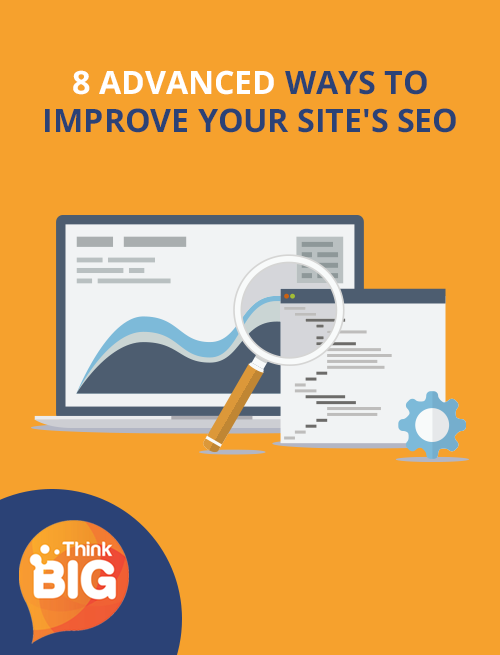
Advanced SEO is crucial for attracting traffic to your site and increasing brand awareness. But with Google’s algorithms constantly developing, it’s not easy to keep up. Before you start deploying advanced SEO, focus on detecting ineffective strategies from the past and stop using them. Once you do that, we have 7 great ways to show you how to improve your site’s SEO.
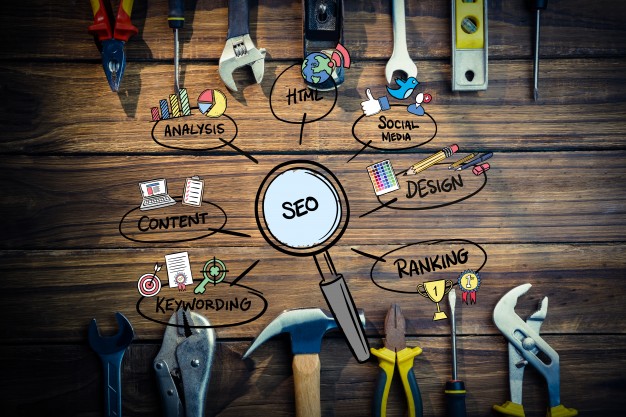
#1 Advanced SEO Keyword Strategies
Keyword research is at the core of every SEO campaign. Those who know basic SEO are probably aware that a keyword is the word or phrase people type into the search box when seeking relevant information.
The more specific your keyword phrase is, the more efficient your SEO will be. Your job is to find the perfect keyword for your site. Bear in mind that targeting the no.1 position on Google at the start of your campaign is almost impossible. Try to set a more realistic goal. For instance, if you’re currently ranked on page 9 on Google, think about how to improve your site’s SEO so that you get ranked on page 5 in, say, a six-month period.
One of the efficient techniques is to focus on long-tail keywords. Even though you might not find them during the research, long-tail keywords are easier to fit in written content and help you get long-tail search traffic.
Once you find the perfect keyword, include it in the content you publish. But there is a catch – overusing of keywords can get you banned from search engines. It is considered a black hat SEO technique and it is absolutely forbidden. In addition, trying to perfectly optimize your content with keywords can compromise the content’s quality & natural flow and, eventually, have an adverse effect.
Another (secret) advanced SEO strategy is to ‘spy’ on your competitors to see what keywords they’re using. You can go to Ahrefs and enter your competitor’s website URL. Click ‘organic search’ you’ll see their top 5 organic keywords at the bottom of the page. For more details, click ‘view full report’.
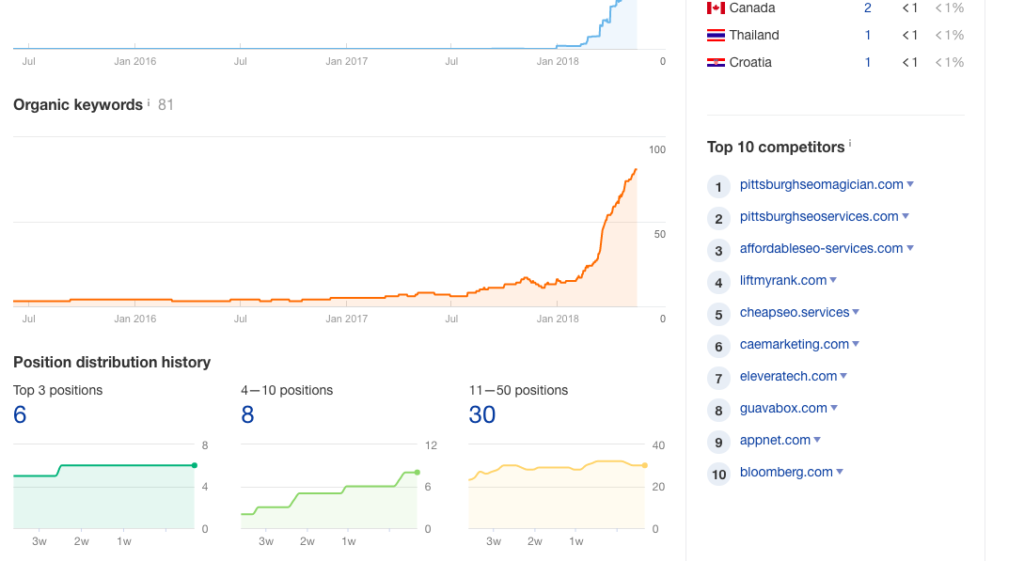
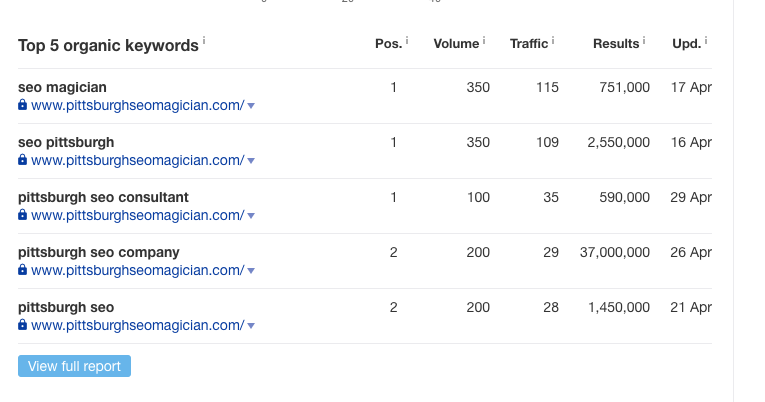
If you don’t know who your main competitors in the niche are, enter your own website URL and click ‘organic search’. You will get a list of your top 10 competitors on the right.
#2 Originality is King
The original phrase goes ‘Content is king’ but if you’re wondering how to improve your site’s SEO, the rule of thumb is – originality. Content is a broad term that covers duplicate and spun content, which can not only get you banned from search engines, but also compromise your site’s authority and credibility.
In addition, by publishing someone else’s content without permission implies a violation of copyright and can have legal consequences. There are great tools like Plagiarism Checker and Copyscape that can help you stay on the safe side.
However, don’t be afraid to re-use your own content. If you’ve been blogging for some time, you must have a great number of articles to work with. Find those that performed best (or still attract organic traffic) using Google Analytics. Select ‘Behavior’, click Site Content – All Pages. Once you find the winner article, you can change any outdated information, make the title more share-worthy, use more attractive images, etc.
#3 Post Valuable Content for Advanced SEO
When it comes to content, another key factor is its value. Your content’s value depends on several factors, including keywords and links (discussed in this article in more detail), but also readability and length.
Search engines appreciate longer content since it shows that you have put an effort in researching the topic and creating the piece of content. In fact, studies have shown a clear link between content length and ranking on search engines. Articles above 1,500 words are shared twice as often as those shorter than 1,500. Smart people have calculated that ideal length for a piece of written content is 1,890 words.
However, when creating your content, you must not forget about the human factor. Ultimately, real people are those you’re striving to attract and convert, so writing lengthy pieces of content just for the sake of word count (also known as ‘fluff’) will not do you much good. Opt for a perfect balance between length and quality.
As far as readability is concerned, you can use tools such as readable.io or Hemingway to check how well you’re doing.

If you ask an SEO expert how to improve your site’s SEO, one of their secret strategies is to focus on finding trending topics that will easily generate buzz on social networks. So, how do you find out what people are talking about at the moment? Google news is one of the quick and easy sources, as is Quora. You can also go to Buzzsumo and select ‘Trending Topics’. There you can find the hottest subjects classified in categories like politics, health, sports, business, fashion, etc.
#4 Pay Attention to Your Site’s Architecture & Navigation
One of the most important advanced SEO strategies is designing your website so that search engine crawlers can find and index your content. The way your website’s navigation is structured is very important in how search engines decide on the importance of each page. Moreover, simple & easy navigation also improves user experience. People who decide to visit your site will leave and never come back if everything is cluttered, disorganized, and if they can’t find what they are looking for. Here’s how to improve SEO by deploying a few simple site architecture strategies.
- Pay attention to internal linking. The more often you link to a page on your own site, the more likely it is to rank higher on search engines. However, make sure you’re not linking to unimportant pages or pages that have little or duplicate content. If you’re uncertain whether you have linked to such pages in the past, you can ‘inform’ the search engines not to index them by using a noindex code.
- Create a simple URL structure. Non-consistent and disorganized URLs can result in search engine crawlers ignoring your website.
- Add a sitemap. A sitemap is a quick guide that describes the structure of your site. Search engine bots use the sitemap to navigate your site and find the elements that are important to them.
- Optimize for mobile devices. People today do everything on the go. Not optimizing for smartphones and tablets means losing potential customers.

- Promote secure browsing. Since security is always an issue on the web, search engines (i.e. Google) support sites that promote secure browsing by giving them extra SEO ranking points. To make your site secure, use Secure Sockets Layer (SSL) or HTTPS.
#5 Optimize On-site Elements
The on-site elements that affect your SEO’s efficiency are:
- meta descriptions
- external and internal links
- title tags
- H1 tags
- ALT tags
- ads
- images
- content length
- text formatting
- bullet points
Even though meta descriptions are not as important as they used to be when it comes to SEO, they still should be present on every page on your website. These, along with the title tags, need to be optimized and relevant.
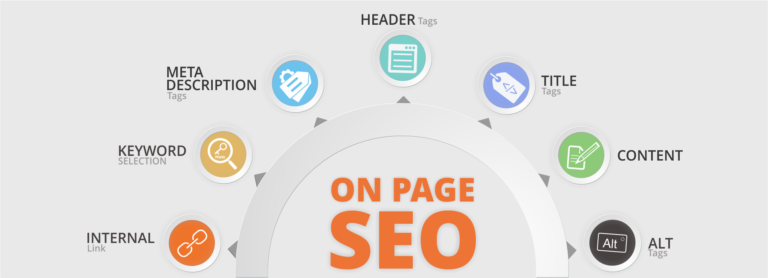
Figure 1 Credit: Wikimedia Commons
#6 Fix Your Page Load Speed
In 2010, Google included the page load speed in the list of factors that affect your site’s ranking. Page load speed is actually the time it takes for your page to load completely. The ideal load time should be up to 3 seconds. It’s not hard to imagine that most visitors will give up and leave if your website takes too long to load. In addition, you will be penalized by search engines and your rankings will fall.
Some of the factors that impact your page load speed include:
- external embedded media
- unoptimized app, browser, and plugins
- too big images
- too many ads
- themes with lots of effects
- social buttons or comment areas
- non-efficient or dense HTML/CSS code
- your host
Check your load speed using tools like Oncrawl or Yslow. Once you find out which elements are slowing down your site, it will be easy to remove, change, and/or optimize them.
#7 Don’t Pay for Links
Creating great content or deploying any other advanced SEO strategy will not do you much good without quality links. Link building is one of the most important SEO strategies used to increase the site’s ranking and visibility.
There are two methods to build links – organic and paid. Paid link building is much faster and easier; however, the topic of selling and buying links is a taboo among most SEO experts. The reason for this is that paid links are against Google’s Guidelines. Search engine bots are getting better at catching links that seem unnatural. If this happens, your rankings can fall or you might end up being banned by search engines.
Instead of spending lots of money to increase the number of links, focus on getting more quality links. This way, you will not only avoid penalties, but you will also improve rankings and drive targeted traffic to your site. Organic link building is achieved through creating excellent content that will earn links naturally, because of its value.
Conclusion
Effective SEO is a combination between optimizing your site for the search engine bots and offering valuable content to your real-life audience. Bottom line is that what makes users happy will most likely make search engines happy as well.

